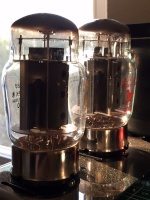Last year I was gifted a set of EH 6550s. Bias has always been steady on all four. Any adjustment has been minimal and probably not required. On a whim, I checked the bias voltages just after the amp was fired up and found one that was at .388, with the rest at .475 and .480. Thirty minutes later I checked again, and all were between .470 and .480 (all bias pots are almost centered). Do I have an output tube in the early stage of failure or should I just not check bias until the amp's been running for an hour? The amp sounds great...
4 posters
ST120 6550 bias drift

Peter W.- Posts : 1351
Join date : 2016-08-07
Location : Melrose Park, PA
- Post n°2
 Re: ST120 6550 bias drift
Re: ST120 6550 bias drift
GreggW wrote:Last year I was gifted a set of EH 6550s. Bias has always been steady on all four. Any adjustment has been minimal and probably not required. On a whim, I checked the bias voltages just after the amp was fired up and found one that was at .388, with the re st at .475 and .480. Thirty minutes later I checked again, and all were between .470 and .480 (all bias pots are almost centered). Do I have an output tube in the early stage of failure or should I just not check bias until the amp's been running for an hour? The amp sounds great...
The latter. Bias is inaccurate until the tube as reached full operating temperature. Bias drift as the tube warms is not linear (although it appears to be from 20,000 feet). A recording voltmeter would show a very rough curve with both upward and downward excursions over very sections of the curve. Overall, it would be interpolated as a smooth curve. Add to this, every tube is different and will behave differently in the tiny details, again looking the same at-a-distance.
From the Apples-for-Oranges Department, here is what bias onset looks like - dots - and how most meters interpret it - line. Be aware: this is for visualization only. This is NOT exactly what it looks like. Similar, only.
https://www.researchgate.net/profile/Sandra_Landi/publication/234951313/figure/fig2/AS:299794703634436@1448488035658/FIG-3-a-Tunneling-current-vs-bias-voltage-curve-for-a-HOPG-sample-and-Pt-Ir-tip.png

Bob Latino- Admin
- Posts : 3276
Join date : 2008-11-26
Location : Massachusetts
- Post n°3
 Re: ST120 6550 bias drift
Re: ST120 6550 bias drift
Peter W. wrote: Bias is inaccurate until the tube as reached full operating temperature.
What Peter has said here is quite true ... Bias will drift UP somewhat as an output tube warms up. It will take about 1/2 hour for most tubes to level off (stabilize) to their "warmed up" bias value. You should make an initial bias setting in a brand new amp on a cold start and understand that it will rise somewhat. After the amp is fully warmed up the bias will stay pretty steady UNLESS your line voltage changes during your listening session. A clue to a line voltage change is that ALL output tubes have gone up or down in their bias. Even a few tenths of a volt up or down in your line voltage will make a noticeable change in your bias reading.
Bob

GreggW- Posts : 80
Join date : 2015-07-15
- Post n°4
 Re: ST120 6550 bias drift
Re: ST120 6550 bias drift
I recall the bias drifted a bit when the tubes were new. Thanks for the information and the advice.

Jim McShane- Posts : 237
Join date : 2011-10-19
Location : South Suburban Chicago
- Post n°5
 Re: ST120 6550 bias drift
Re: ST120 6550 bias drift
Bob Latino wrote:Peter W. wrote: Bias is inaccurate until the tube as reached full operating temperature.
What Peter has said here is quite true ... Bias will drift UP somewhat as an output tube warms up. It will take about 1/2 hour for most tubes to level off (stabilize) to their "warmed up" bias value. You should make an initial bias setting in a brand new amp on a cold start and understand that it will rise somewhat. After the amp is fully warmed up the bias will stay pretty steady UNLESS your line voltage changes during your listening session. A clue to a line voltage change is that ALL output tubes have gone up or down in their bias. Even a few tenths of a volt up or down in your line voltage will make a noticeable change in your bias reading.
Bob
Let me just add to what Bob said by mentioning that it is not only the tubes that need to be warm. I recommend enough warm up time to ensure that not only the tubes but the components around them be fully warmed. Parts change value with temperature which can cause the bias to change.
So if you set the tube bias once the tubes are fully warmed that's fine - but recheck again after the whole amp is warmed to normal operating temperatures. You may need to make a few minor changes in the bias settings.

GreggW- Posts : 80
Join date : 2015-07-15
- Post n°6
 Re: ST120 6550 bias drift
Re: ST120 6550 bias drift
Bias checked after amp running for 90 minutes. Bias voltage variance was .012; that's probably close enough. Thanks to all for the great information and advice...

Jim McShane- Posts : 237
Join date : 2011-10-19
Location : South Suburban Chicago
- Post n°7
 Re: ST120 6550 bias drift
Re: ST120 6550 bias drift
GreggW wrote:Bias checked after amp running for 90 minutes. Bias voltage variance was .012; that's probably close enough. Thanks to all for the great information and advice...
.012 volts across the 10 Ohm resistor in each power tube cathode of your amp gives you 1.2 milliamps current difference. That's PLENTY close - good job!
